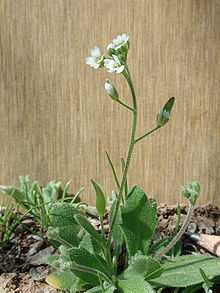Draba cuneifolia
From Wikipedia, the free encyclopedia
| Draba cuneifolia | |
|---|---|
 | |
| Scientific classification | |
| Kingdom: | Plantae |
| (unranked): | Angiosperms |
| (unranked): | Eudicots |
| (unranked): | Rosids |
| Order: | Brassicales |
| Family: | Brassicaceae |
| Genus: | Draba |
| Species: | D. cuneifolia |
| Binomial name | |
| Draba cuneifolia Nutt. ex Torr. & Gray | |
Draba cuneifolia is a species of flowering plant in the mustard family known as the wedgeleaf draba or wedgeleaf whitlow-grass. This annual plant is native to the southern half of North America where it grows in open, rocky fields and disturbed areas. The plant forms a basal cluster of leaves, which are thick, widely toothed, and coated in stiff hairs. It bolts one or more erect stems which may approach 40 centimeters in maximum height. Each hairy stem bears an inflorescence of up to 75 small white flowers that continue at intervals down the stem as the stem grows in height. At fruiting the stem is lined with many fruits on stalks, which are flat, green siliques up to a centimeter long.
External links
This article is issued from Wikipedia. The text is available under the Creative Commons Attribution/Share Alike; additional terms may apply for the media files.